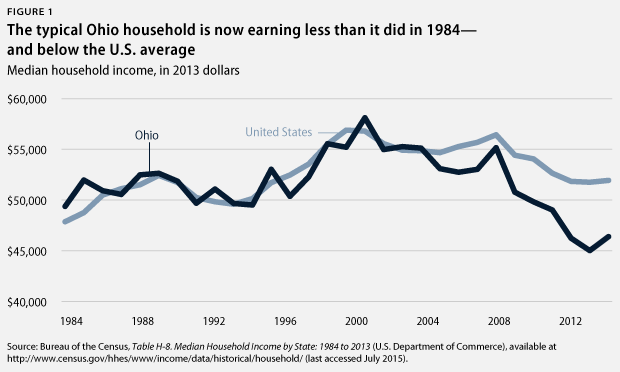In the wake of a crippling economic recession and a recovery that has left too many working and middle-class Americans behind, Ohioans are struggling to gain back lost ground. The median household income in Ohio is lower than it was before the recession. Moreover, although the Ohio economy has grown in the past 30 years, those gains have disproportionately benefited the state’s wealthiest: Between 1984 and 2013, the share of earnings going to the middle 60 percent of households in Ohio dropped 5.4 percent, while the share of the earnings by the top 20 percent rose 5.3 percent.
It should come as no surprise that as Republican presidential candidates—including former Florida Gov. Jeb Bush, Louisiana Gov. Bobby Jindal, Ohio Gov. John Kasich, former Texas Gov. Rick Perry, and Wisconsin Gov. Scott Walker, as well as Sens. Ted Cruz (TX), Lindsey Graham (SC), Rand Paul (KY), and Marco Rubio (FL)—court Ohio voters, they have tried to reframe their rhetoric to make the policies they support sound more appealing to working families.

But while these candidates are hoping to position themselves as supporters of Ohio’s middle class, their records tell a different story. The GOP presidential candidates detailed in this report have consistently supported tax policies that benefit the wealthy at the expense of low- and middle-income Americans, prevent low- and middle-income people from getting good-paying jobs, make it harder for families to juggle responsibilities at work and at home, and increase the burden for students and families looking to climb the economic ladder.
These candidates’ policies would have a real impact on Ohio’s working families, including:
- Redistributing tax benefits to the wealthy. The records of the GOP candidates detailed in this report show broad support for tax plans that would overwhelmingly benefit the wealthy. For example, some candidates support eliminating the federal capital gains tax—a move that would benefit 92 percent of the 9,280 Ohio taxpayers who made $1 million or more in 2012 but that would have almost no impact on Ohio’s middle class.
- Making it harder to preserve and to create good-paying jobs. Several Republican candidates back policies that would make it harder for workers to get good-paying jobs, including right-to-work laws. Many Republican candidates also opposed the federal rescue of the automotive industry, even though the number of auto industry jobs in Ohio increased at more than three times the state’s overall job growth rate and accounted for 12.4 percent of all jobs created in Ohio between 2010 and 2014.
- Blocking policies that help families balance work with child care. Gov. Walker and Gov. Jindal have blocked efforts to guarantee paid sick leave—a policy that would help working families in Ohio; both also have signed laws that stop cities from instituting policies that guarantee workers paid sick leave. The current senators running for president voted against paid sick leave at the federal level.
- Ignoring runaway college tuition costs. Gov. Jindal and Gov. Perry presided over skyrocketing tuition and fees for college education at public universities in their states. Tuition and fees climbed 61.4 percent in Louisiana under Jindal, compared with 17.4 percent in Ohio over the same time period. They climbed 168.4 percent in Texas under Perry, compared with 99.1 percent in Ohio over the same period.
As these candidates vie for the support of Ohio’s working families, it will be important to square their recent rhetoric, increasingly filled with promises to be champions of the middle class, with the reality of their records. These candidates’ records clearly show support for policies that would set Ohio working families back rather than help them get ahead.
Ryan Erickson is the Associate Director of Economic Campaigns for the Center for American Progress Action Fund.